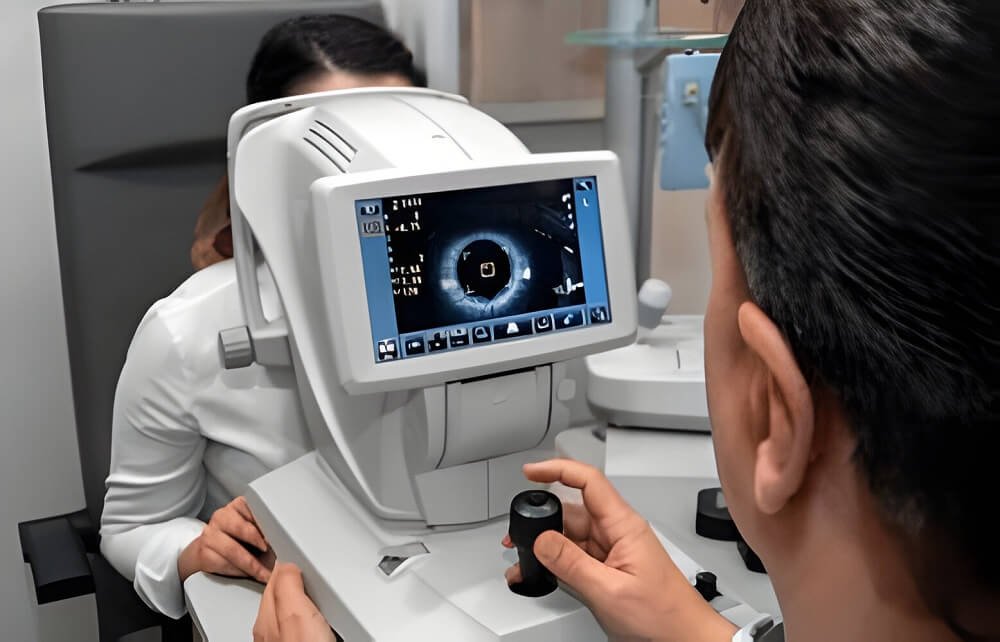The auto refractometer is an important tool in eye care. Optometrists and ophthalmologists widely use it to measure how light is bent in the eye. This measurement helps determine the need for glasses or contact lenses. This article will explore what an auto refractometer is, how it works, and why it benefits both patients and eye care providers.
What is an Auto Refractometer?

An auto refractometer is a device that measures refractive errors in the eye. Refractive errors occur when the eye cannot focus light properly on the retina. This can cause blurry vision. Common refractive errors include nearsightedness, farsightedness, and astigmatism. The auto refractometer helps determine the degree of these errors, which is essential for prescribing corrective lenses.
How Does an Auto Refractometer Work?
The process of using an auto refractometer is simple. The patient looks into the device, usually at an image or light inside the machine. The device shines a light into the eye, which reflects off the back of the eye. The auto refractometer measures how the light changes as it returns through the eye’s lens and cornea. Based on these measurements, the device calculates the eye’s refractive error.
Benefits for Patients
Quick and Easy
One of the biggest benefits for patients is the fast and easy process. The auto refractometer takes just a few seconds to measure each eye. This quick measurement is helpful for busy individuals who don’t have much time. It also makes the eye exam experience more comfortable for everyone.
No Discomfort
The auto refractometer is non-invasive, meaning it does not cause any discomfort. Patients simply look into the device without needing any eye drops or other preparations. This comfort is especially important for children or those with sensitive eyes.
Accurate Results
The auto refractometer provides accurate results. It gives a reliable initial measurement of the eye’s refractive error. While these results are often confirmed with additional tests, they serve as a solid starting point for determining the correct prescription.
Great for Kids and Non-Communicative Patients
This device is particularly useful for children and patients who have difficulty explaining their vision problems. Young children might not know how to describe what they see, and some adults may struggle with communication. The auto refractometer provides an objective measurement that ensures these patients receive the right care.
Benefits for Practitioners

Increased Efficiency
For eye care practitioners, the auto refractometer increases efficiency. It allows for a quick and easy assessment of refractive errors. This efficiency means practitioners can see more patients in a day without sacrificing the quality of care.
Consistent and Reliable
The auto refractometer gives consistent and reliable results. Since the device automatically performs the measurement, human error is reduced. This consistency is crucial for developing accurate treatment plans for patients.
Easy to Use
The auto refractometer is easy to use and requires minimal training. It can be quickly integrated into any eye care practice, whether large or small. This simplicity allows practitioners to focus more on patient care and less on operating complex equipment.
Portable for Mobile Clinics
Many auto refractometers are portable, especially handheld models. This portability is beneficial for practitioners who work in mobile clinics or remote areas. They can easily bring the device to different locations, ensuring that more people have access to quality eye care.
Versatile Applications
The auto refractometer is versatile and can be used in various situations. It is often used in routine eye exams but is also valuable in pre-surgical assessments, such as before LASIK surgery. Additionally, it can track changes in vision over time, helping to monitor the progression of eye conditions.
Builds Patient Trust
Using advanced technology like the auto refractometer helps build trust with patients. When patients experience a quick, comfortable, and accurate eye exam, they are more likely to trust their eye care provider. This trust can lead to stronger patient relationships and positive referrals.
Conclusion
The auto refractometer has greatly improved eye care. It benefits both patients and practitioners by making eye exams faster, more comfortable, and more accurate. For patients, it means a quick and easy experience with reliable results. For practitioners, it offers efficiency, consistency, and versatility. As eye care technology continues to advance, the auto refractometer will remain a crucial tool in ensuring that everyone receives the best possible vision care.





